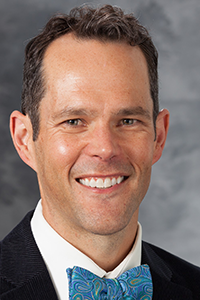
About
Ryan was raised in Wisconsin in the metropolis of Beaver Dam. He loves fitness, outdoors, theater, reading, spending time with his family, and collaborating with really smart and curious people.
Education
- MD, University of Wisconsin School of Medicine & Public Health
- PhD, Neuroscience, University of Wisconsin - Madison
Research Description
I am an Associate Professor and Director of the Division of Child and Adolescent Psychiatry at the University of Wisconsin – Madison. I am a physician-scientist specialized in child and adolescent psychiatry and affective neuroscience. I have a long-standing interest in understanding how stress alters neurodevelopment and behavior, and how this information can be used to prevent and treat mental illness in youth. My training began at the University of Wisconsin, where I completed a PhD in Neuroscience under Dr. Ned Kalin. In my dissertation studies, I characterized the effects of stress on amygdala corticotropin-hormone system genes, and translationally extended this work to clinical samples in postmortem brain analyses. During psychiatry residency and the child psychiatry fellowship at the University of Pittsburgh, I utilized structural and functional neuroimaging to study clinical populations with trauma exposure and PTSD, in collaboration with Drs. Mary Phillips and Anne Germain. Clinically, I gained expertise in the assessment and treatment of traumatized youth and trained with Drs. Judith Cohen and Anthony Mannarino in the use of Trauma-Focused Cognitive Behavioral Therapy (TF-CBT). Since returning to the University of Wisconsin as faculty, my lab has been examining structural and functional abnormalities in emotion regulatory circuitry in pediatric PTSD, with funding via the AACAP Junior Investigator Award, the NARSAD Young Investigator Grant, an NIMH Career Development Award, and R01 independent investigator grants from NIMH. Complementing this work, I have been examining the effects of childhood adversity on cognitive-emotional circuitry in a community sample of adolescents within the longitudinal Wisconsin Study of Families and Work. Notably, this combined work has implicated key prefrontal-amygdala circuits as a vulnerability point for the effects of childhood maltreatment and the development of affective disorders in youth. Finally, mentorship and teaching are an important part of my career path and the University of Wisconsin mission. I supervise and mentor post-doctoral fellows, and graduate and undergraduate students in my lab, as well as psychiatry residents in their clinical work. I am also a faculty trainer for four T32 fellowship programs at the UW.
Affiliations
- Affiliate Faculty, Psychology, University of Wisconsin - Madison
- Member, Program Committee, Editorial Board, American Academy of Child & Adolescent Psychiatry
- Member, Program Committee, Society of Biological Psychiatry
Honors
- NIMH Outstanding Resident Award, National Institute of Mental Health
- NIMH Brain Camp, National Institute of Mental Health
- Young Scholar Travel Award, Translational Research on Child Neglect Consortium
- Career Development Institute for Psychiatry, University of Pittsburgh/Stanford University
- Research Colloquium for Junior Investigators, American Psychiatric Association
- Educational Outreach Program Travel Award, American Academy of Child & Adolescent Psychiatry
- General Psychiatry Diplomate, American Board of Psychiatry and Neurology
- Child and Adolescent Psychiatry Diplomate, American Board of Psychiatry and Neurology
- Domestic Travel Fellowship Award, Society of Biological Psychiatry
- Career Development Travel Award, Anxiety and Depression Association of America
- Distinguished Fellow, American Academy of Child & Adolescent Psychiatry
